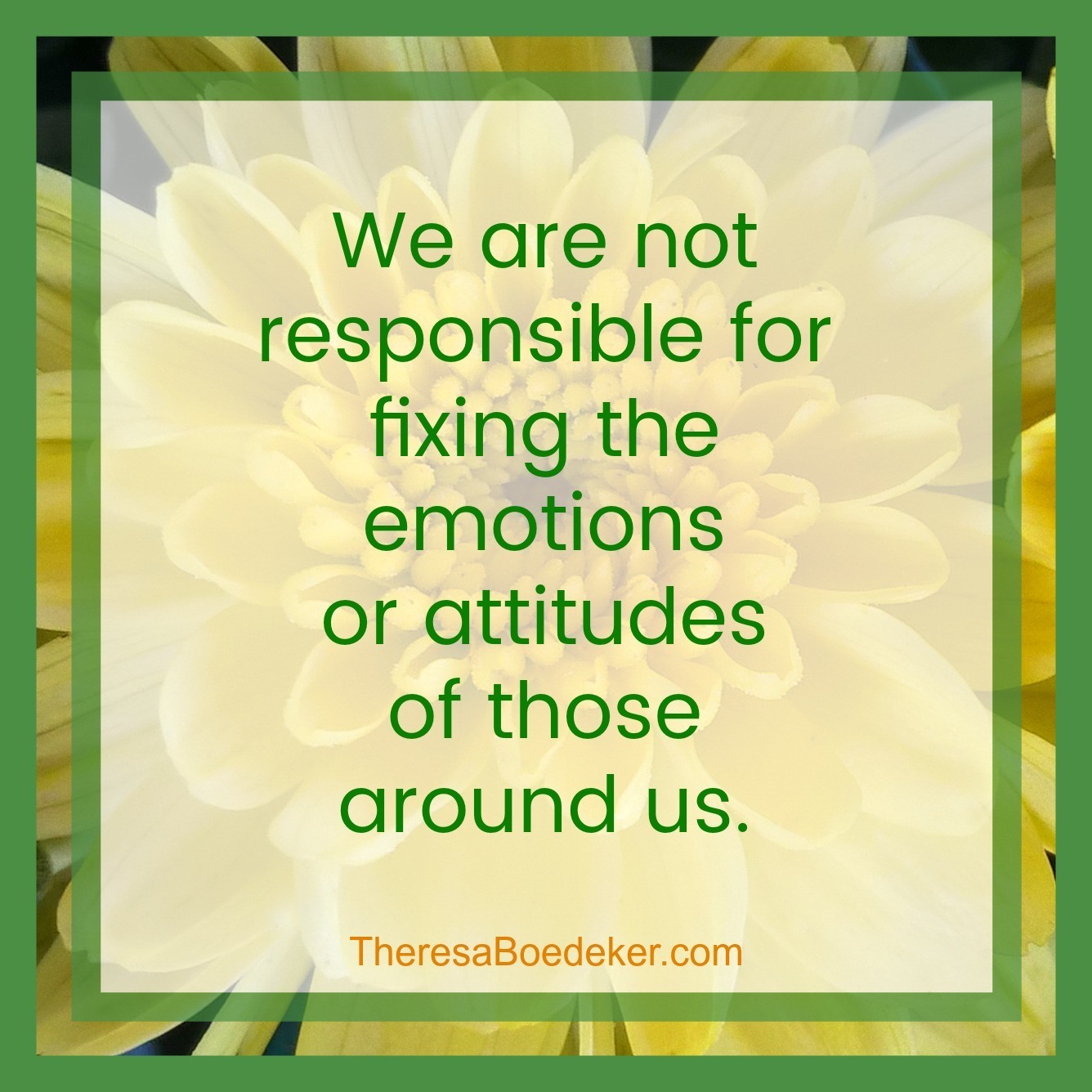I’m a fixer.
I’m a doer.
Perhaps you are too.
I see the bed unmade and I make it.
The toilet is running. I reach in, push the flapper down, and stop the waste of running water (yes, I have even been known to do this in public bathrooms! I know!).
I see someone next to me and their shirt tag is waving their size and brand, and without thinking I reach over and tuck it back in.
A child looks lost and is frantically looking about for a familiar face, I stop and talk to them. Make sure they are alright.
And if someone looks unhappy, my first instinct is to go make them happy.
I know that sounds silly. Make someone happy. Because we can’t make someone happy. They have to decide they want to be happy, but still I try.
And often I can cheer them up. Make them giggle. Get them to smile.
Which I consider success.


Do you have my problem?
See the problem is that somewhere in my life, and yes it probably stems back to my family of origin, I decided (or thought) I was responsible for the people around me being happy. Emotionally stable. In a good mood. What ever you want to call it.
Maybe it was because being in a “good” mood and being happy was the main emotion we were allowed, or were supposed to exhibit growing up.
I am sure having a teen friend who was highly insecure didn’t help. She would come over to our house for youth groups and at the last minute decide she could not attend. She would recite reason after reason why she could not attend, and my sister and I would deny and topple each reason. Then my sister would get tired of her nonsense and leave her to me. 20 or 30 minutes later I would finally talk her into attending. And then the next week, it would happen again.
So early on I became a fixer of others.
Eventually I had children. And while they were young I was responsible for doing practically everything for them. And that meant helping them learn to control their emotions. Divert their tantrums. Get them to smile on cue for photos.
It didn’t take much to change their moods when they were young.
My son is now a teenager, and he can be unhappy. My husband can have a hard day at work and come home grumpy. My friend loses her baby. My neighbor is moving. All these people are a little unhappy. Grieving or processing their emotions.
My natural instinct is to jump up and sing and dance and try to make them happy.
Only it is not my job.
And it is not always what they need. Or want.
I have been hopping around trying to make people happy for so many years, diverting tantrums, smiling and making faces until the kids smile, trying to cheer up the sad hearted, that I think I am responsible for making everyone around me happy.
But I am not.
And neither are you.
We are all responsible for our own feelings.

Are emotions good or bad?
Here is one thing I am unlearning from my youth. Emotions are NOT divided into 2 categories. Good emotions and bad emotions.
No. All emotions are necessary. Yes, we are more comfortable with some emotions, like happiness, and less comfortable with other emotions, like sorrow.
The emotions themselves ae not good or bad, desirable or undesirable, it is how we process or deal with our emotions that can healthy or unhealthy and cause problems for others.
Pain is not a bad emotion. But if we drink, shop, or retreat from life to mask our emotional pain, then we can get in trouble and cause more problems.
Happiness is not a bad emotion. But if we pretend we are happy when we are not, then that can get us in trouble and cause more problems.

We can’t always fix them, and that is alright.
My daughter and I got all dressed up and drove to attend a play that she really wanted to see. The problem was, we showed up a day late. I felt horrible. Yes, mommy guilt was cursing through my veins. My daughter was sad. Upset. Disappointed. And Angry. And it was all my fault.
We had missed the last show, so there was no buying new tickets. Our chance had come and gone.
Well, I tried to cheer my daughter up. I told her I was sorry. Made a joke about being all dressed up with no where to go. Tried to find the positive. Told her things could be worse. And who knows what else.
But my daughter was still sad. Disappointed. Upset. Angry.
It was one of those times I realized that I could not dance and sing her happy. And it hurt. And it was uncomfortable. Because it was my fault.
And that was alright. Only it didn’t feel alright.
I wanted her to get over her emotions right away, but she couldn’t.
We went out to donuts, I think, but donuts just don’t compare to a Broadway play.
It is hard as parents seeing our children trying to work through their emotions. It is hard as spouses when we see our mates working through difficult time. It is hard when we see our friends grappling with big changes and emotions. It is hard when we can’t solve things. Make things better. Wave a magic wand.
We can watch them wade through the emotions, but we can’t do it for them.
I know sometimes their emotions make me uncomfortable, and so I want to fix them. But only they can fix them.
Or maybe I feel responsible for their emotions, like I did with my daughter and missing the play, so I want to fix them.
But I can’t fix them. And that is hard. But it is alright.

What you can do to help the other person deal with their emotions?
I am leaning that sometimes the best thing to do is just be there. Be available for the person.
Let them sit and process their emotions, and not try and hurry them to happy.
Instead of talking, listen to them. Then asking a few questions that lets them tell you where they are coming from. And why. Then listening some more.
This technique requires us to let them come to some of their own conclusions. To bite back some of our wonderful insights and conclusions. To not do most of the talking and telling.
But it works.
They process through their emotions and return to their usual self easier if they can talk about how they are feeling, and why they feel that way.
Isn’t this what we all want? To be understood and heard?
This may mean letting them be sad for a while. Not hurrying or short changing the grieving process. Or the healing process.
It’s hard, because we often want to fix them on our terms and time.
But that will not work for them.

Resisting the urge to fix.
Let’s stop feeling responsible for fixing everyone’s attitude or emotions.
Because we are not responsible for fixing them.
Instead, let’s help them process their emotions. Listen. Ask questions. And listen some more.
We won’t do it perfectly.
And it will feel strange. All new things do. But as we try, we will be learning. And progress will be made.
Both for them. And for us.

Thanks for stopping by. Keep remembering what’s important.
Theresa
If you need some weekly encouragement and hope, tied up with some humor? Subscribe and join the journey. Life is sweeter when we walk alongside one another.
Join the Discussion: Do you feel this need to fix the emotions of those nearest you?
 May link up at Holley Gerth (#coffeeforyourheart), Lori Schumaker (#Moments of Hope), Crystal Storms (#HeartEncouragement), Arabah Joy (#Grace & Truth).
May link up at Holley Gerth (#coffeeforyourheart), Lori Schumaker (#Moments of Hope), Crystal Storms (#HeartEncouragement), Arabah Joy (#Grace & Truth).


- How Knowing Your Husband Can Impact Him for Good - March 24, 2022
- How to Stop Focusing on What’s Wrong with You - March 9, 2022
- Is God Really Good All the Time? - February 24, 2022
Oh Theresa! I’m hearing you loud and clear on this one. Although I would add that often, it’s my happiness that tends to be affected when other people are having a bad day. 🙂 Thus my little motto: “My happiness does not depend on your mood.” It is a continual struggle for me not to react to reactions … sometimes I do OK, sometimes I do not! And yes, I also want to fix everyone’s problems so that they are happy and all is right in my world. (This is starting to sound very self-centered, ugh!) I love your solutions … listening, asking questions, just being there … thank you for this thoughtful post!
Oh Lois! Yes, I hear you loud and clear. Because like you, I can let my happiness be affected by their mood or bad day. Ugg. And like you, I have to remind myself that my happiness does not depend on their day or mood. And it is something I will be reminding myself until probably the end of my life. 🙂
I think some people enjoy being miserable and others enjoy making others miserable, that said, there are those of us who want to be a blessing and it is hard when you can’t fix something. It is not our mission. If God has given you His Sonshine, share it, He will do the rest. Happiness is temporary and joy is from Him.
It is hard when we can’t fix something. But like you said, it is not our mission. Remembering this will make life easier on us and them. Keep sharing your sunshine too, Rebecca.
Thank you Teresa, I always enjoy your blog.
What wisdom in these words! I certainly do struggle with this. Over the years, I’m learning that mostly, people just need a safe place to open up and unload their burdens. Thanks for sharing this trusted insight! I need to remember it often!
Hey Stacey. Learning the same thing. Also, that I am not called to solve people’s problems. Most people want us to listen, not to solve their problems. Often letting them talk helps them solve their own problem.
I definitely used to struggle with this a lot too- taking on too much responsibility for everyone around me and thinking that I had to make everything ok. I’ve gradually learned that it’s not my job to do that and, as you say, we can’t always fix it. Have you seen the movie Inside Out? I love how it explores the different emotions and the clip where Sadness comforts Bing Bong is such a powerful illustration of why we need to empathise with others’ difficult emotions rather than just trying to cheer them up.
No, to seeing the movie. Sounds like it would be insightful. Thanks for the recommendation.